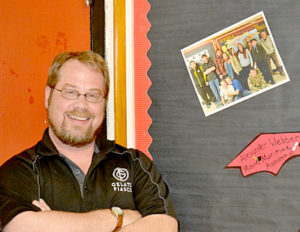
Outgoing Wiscasset School Committee Chair Steve Smith stands next to a picture of his son, graduating senior Sam Smith, after his final Wiscasset School Committee meeting June 15. (Abigail Adams photo)
Wiscasset School Committee Chair Steve Smith called his last meeting to order June 15. With the meeting ended a three-year term that oversaw the establishment of an independent school district.
During his tenure, the Wiscasset School Committee established its own budget for the department after a contentious withdrawal from RSU 12, closed one of Wiscasset’s three schools after difficult discussions that split the community, negotiated and approved new union contracts with teachers and support staff, hired two interim superintendents, and signed a five-year deal with the current superintendent.
For all the growing pains the Wiscasset School Department has experienced in establishing its own district, people are proud of their schools, Smith said.
“The school system is a part of this town that’s going on 100 years,” Smith said. “To be able to educate children in this community for as long as we have is a real source of pride.”
Community support for the school department is evident at the polls, Smith said. In a town where several departmental budgets have been voted down over the years, the three budgets presented by the Wiscasset School Department have each passed by a large majority.
Smith was not involved in the RSU 12 withdrawal process, but ran for the school committee because he was concerned that other candidates wanted to immediately close one of Wiscasset’s three schools.
“My whole goal getting on the board was so we could take a long look at it and not make a knee-jerk decision,” Smith said. One of the first decisions the school committee made was to keep all three schools open for another year, and take a close look at the issue going forward.
For Smith, one of the things the school committee did best was hire the department’s superintendents. The superintendent search is where Smith focused his energies once on the board – the department’s first two superintendents were hired on an interim basis by design, he said.
“They each did exactly what we hired them to do,” Smith said.
Wayne Dorr, a former superintendent of Wiscasset, was the first to be hired – he was charged with establishing a budget for the department that was separate from RSU 12. “He did the job brilliantly,” Smith said.
Lyford Beverage was next. “He was hired to close a school,” Smith said.
The committee decided to hire an interim superintendent for the process because members knew it would be a controversial process and did not want to saddle a long-term superintendent with the bad feelings from parents and staff that could result, Smith said.
“We knew closing a school would not be a process where everyone would come out smiling,” Smith said. In the decision to close the primary school, the school committee weighed its options and listened to the multitude of opinions expressed by the community.
The 3-2 vote of the school committee to close the primary school in 2014 was supported by voters by a large margin when the decision was later taken to the polls as the result of a citizen’s petition.
“There was a group of people on both sides of the issue,” Smith said. “It was difficult, but the people really had a say in this.”
The inclusive process the school committee followed for not only hiring a superintendent, but also debating issues, would result in bringing Dr. Heather Wilmot on board as the Wiscasset School Department’s first non-interim superintendent, Smith said.
The hiring process involved the input of teachers, staff, administrators, parents, and community members, Smith said. Wilmot was initially hired on a three-year contract, which has since been extended to five years. “Hopefully, she’ll stay for the next decade,” Smith said.
The negotiation of staff and teacher contracts was another labor-intensive process undertaken by the school committee, which yielded enormous rewards, Smith said. The Wiscasset School Department inherited the RSU 12 contracts when it became an independent district.
The RSU 12 contracts were a blend of all the contracts from the schools in RSU 12. “It was a compromise contract,” Smith said. “It wasn’t built for a single town or school system.”
According to Smith, the school committee made developing a Wiscasset-centric union contract a priority. The old contract was ripped up, and for two years, staff and teachers and the school committee wrote a new one, word by word. Both contracts, with staff and teachers, were recently signed.
The contracts will need to be renegotiated in about a year, but the framework and the language for the contracts has been established, Smith said. “It was built for the town of Wiscasset,” he said. “Even though it was a long process, it was a really great contract and it will make it easier for future boards.”
With many of the projects the school committee has worked on since forming now complete, Smith felt comfortable leaving the board. One of his last orders of business as chair was to hand a diploma to his son, Sam Smith, at graduation.
As Smith turns his full energy and attention to his work as sales director for Gelato Fiasco, a Maine company that has grown to distribute its products nationwide to tens of thousands of retailers, he wishes the school committee luck in the future.
Smith’s greatest hope for the school committee as it moves forward is for more parents and community members to become involved with its work. With the implementation of a proficiency-based system, “education is changing. The way we teach kids is changing,” he said.
The school committee is charged with determining the future direction of the school system; it’s crucial that the community be involved to give the committee input and guidance, Smith said.



